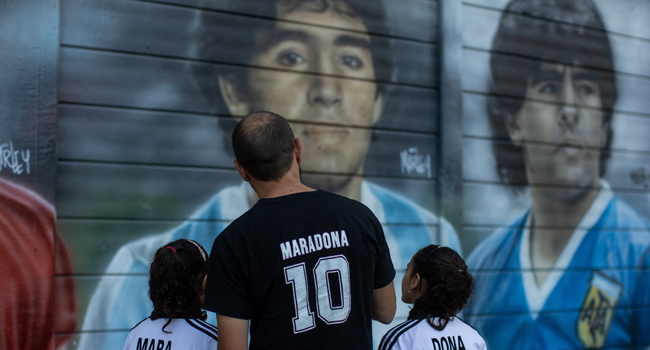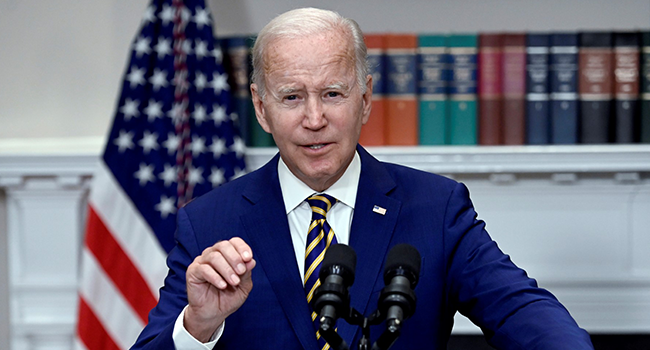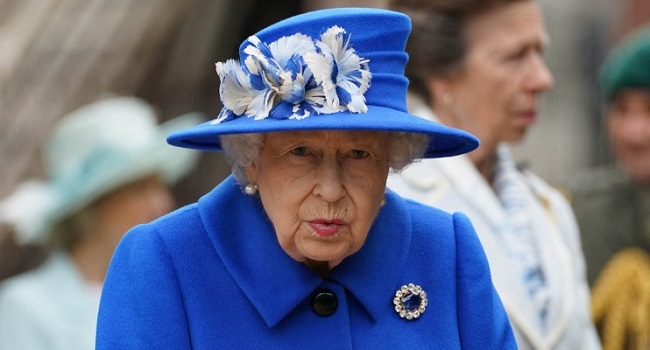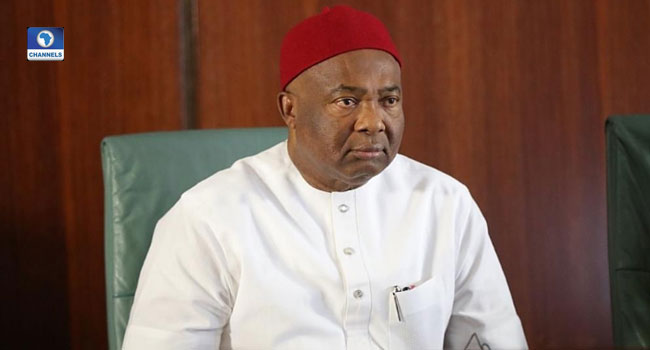
From a bronze statue unveiled in Naples to humble offerings of flowers at his childhood home in a Buenos Aires slum, people around the world mourned the death one year ago Thursday of football great Diego Maradona.
Fans, players, coaches, clubs, and loved ones paid homage to the man revered for his talent and adored for his grandiose life and legacy.
From Villa Fiorito, a poor neighborhood of Buenos Aires where Maradona grew up, to Italy’s Naples, where he spent several years of his stellar career, and India, tributes abounded.
On football pitches in Argentina, players arranged themselves in a “10” formation to honor the famous jersey number of the man nicknamed the “Pibe de Oro” or Golden Kid, as fans chanted “Marado, Marado!”
Outside his humble childhood home, bouquets of flowers and messages piled up — one reading: “You gave us heaven.”
“Maradona was the voice of the Argentine people. We will miss him and love him all our lives,” said fan Jose Maria Fernandez, through tears.
READ ALSO: Manchester United Reach Deal With Ralf Rangnick Over Managerial Position

View of a football with an image of late Argentine football legend Diego Armando Maradona during a homage on the first anniversary of his death, in Montevideo, on November 25, 2021.
Dante Fernandez / AFP
At the cemetery in Bella Vista, where his remains are, fans defied heavy rain to pay tribute at a giant graffiti inscription reading: “Here rests D10S” — a play on the Spanish word for god, “Dios.” Only family was allowed inside.
In Kolkota, India, a statue of Maradona was decorated with flowers, while in the southern Kerala state, fans gathered at a hotel where the footballer stayed in 2012 and which has become something of a shrine.
“We are all Maradona fans and we miss him a lot,” Ravindran Veleimbra, owner of the Hotel Blue Nile in Kannur, told AFP.
‘Football’s great god’

In Naples, where Maradona is almost as much of an icon as in Buenos Aires, a bronze statue of the athlete was inaugurated outside the Napoli stadium — renamed in his honor following his death.
Another will be unveiled inside the stadium on Sunday so that “players will be able to touch the hands and feet of football’s great god,” said Napoli football club president Aurelio De Laurentiis.
Maradona died of a heart attack a year ago Thursday aged 60, weeks after undergoing brain surgery for a blood clot.
The former Boca Juniors, Barcelona, and Napoli star had long battled cocaine and alcohol addictions and was suffering from liver, kidney, and cardiovascular disorders when he died.
His death shocked fans around the world and tens of thousands lined up to file past his coffin, draped in the Argentine flag, at the presidential palace in Buenos Aires during three days of national mourning.
“It’s been a year since the world has been more horrible because you are no longer here,” Dalma Maradona, the star striker’s eldest daughter, wrote on Twitter Thursday.
‘Hand of God’
View this post on Instagram
Brazilian football great Pele paid tribute to his fellow legend on Instagram, writing: “One year without Diego. Friends forever.”
And Lionel Messi, who captains the Argentine 11 like Maradona before him, wrote on social media: “Diego Eternal” with a photo of him wearing the national jersey with Maradona’s face on it.
He may be dead, but in Argentina, Maradona is everywhere — from ubiquitous murals to television series about his life and even a “church” bearing his name.
In a country where football is a religion, he is a god.
Maradona’s two goals in the 1986 World Cup quarter-finals, which saw Argentina triumph over England just four years after the Falklands War, made him an instant hero.
He is perhaps remembered as much for his “Hand of God” goal — which illegally came off his hand in what he ascribed to supernatural intervention — as for his second in the same match against England, which would later become known as the “Goal of the Century.”
His rags-to-riches story, stellar sporting achievements, complicated life and dramatic death entrenched his place in the Argentine psyche.
Murals in Buenos Aires depict Maradona with angel wings, as a patron saint complete with halo and scepter, or kissing the World Cup.
Maradona’s name continues to make headlines as well, with Argentines closely following an investigation into his death in which seven caregivers, including his neurosurgeon, are charged.
A panel of 20 medical experts concluded in April that Maradona’s treatment was rife with “deficiencies and irregularities” and said his medical team had left his survival “to fate.”
The probe has been competing for headline space with the court case over an inheritance dispute involving two of Maradona’s daughters.
Adding to the news coverage, this week, a Cuban woman who had an affair with Maradona as a minor 20 years ago, accused him and his entourage of abuse, including rape.
AFP




